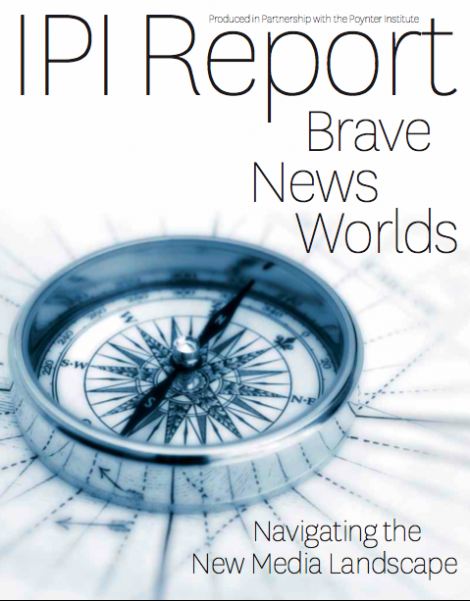Update #4, Wednesday, Sept. 22, 09:00 Hong Kong
TAKEAWAY: A recently published report from the International Press Institute (IPI) gives us reason to pause and to believe that the craft of journalism is alive and re-energized, and its practitioners finally out of the lamenting mode and moved to action. PLUS: William Powers, author of Hamlet’s BlackBerry chimes in after reading our blog entry: disagrees that news has changed

Experts agree: craft must adapt to changes

I came across a commentary by Bill Mitchell, my Poynter Institute colleague, that was a strong reaffirmation of something that I have been thinking much about ever since the start of September. Bill writes that he found himself ” hooked by an idea that has no metrics but seems quite real nonetheless: a significant shift in attention from the diminishment of journalism to its rediscovery and reinvention. “
Indeed, Bill, I am in total agreement.
Again, there is no scientific research to back this up, but plenty of the type of evidence that is nuanced, extracted from conversations with editors and publishers in newsrooms and conferences, reading between the lines in email exchanges, and an overall good feeling about the direction things are going in our industry.
I have often told newsroom leaders that this is a time to celebrate, not to lament. It is the best time for us storytellers because we have the best stories and more platforms in which to display them.
But this is of little consolation to publishers who have seen their newspapers and magazines being hard hit by the economic crisis, sliding readership and the necessity to do more with less.
But, just like we now have heard that the economic recession has officially ended, and that there are better times ahead——we all hope so—-I believe that the period of lamenting is also over for the journalists, which is why I am so happy to read Bill’s column, and then turn to the insightful report from the International Press Institute (IPI), titled “Brave News Worlds: Navigating the New Media Landscape,” which you can download.. By the way, Poynter as IPI’s publishing partner.
The report is a collection of 42 essays, with an introduction by Bill Mitchell. I was honored to be part of this report. My essay is titled: The Tablet Innovates News Presentation as Color Did in 1970s
I conclude my essay with an explanation of why the “print edition remains a critical element in multi-platform success.”
Bill told me by email that, in a closing session of the IPI congress last week, he raised the issue of print’s future by referring the audience to my essay and one by our Poynter colleague Paul Tash, who chairs the Institute and the newspaper it owns, the St. Petersburg Times. You’ll see a brief excerpt from Paul below.
In the audience was Phil Gailey, the retired editor of editorials at the Times, who described the Times’ free tabloid edition, tbt*. Phil said he was skeptical of the edition, which includes much racier headlines and copy than you’ll find in the main sheet, but has become a believer. Paul points out in his essay that tbt*‘s advertising revenue now exceeds that of the paper’s website.
Reasons for optimism
The report is full of suggestions and statements that allow us to see the role of newspapers, specifically, in a new light—-not eliminating them outright as a medium of the past, but reassigning new tasks and redefining the very essence of news. Essentially, the report is encouraging about journalism generally. Part of the reason it is “must read” for everyone in the industry is that it is not newspaper-centric. Instead, it applauds efforts of journalists to extend their craft beyond one medium, examines successful business models, praises titles and journalists that engage with their communities. As I read through the various essays, I see that the word “news” is used often, and its redefinition discussed in ways such discussions should take place in the newsrooms around the world.
I highlight here some statements of consequence that hit a chord with me as I read through the report the first time:
Jeff Jarvis:
We must blow up our conception of a news organization—and news. Very soon, we had better hope that news- papers aren’t just papers any more but are valued members of larger networks that enable their communities to gather, share, and make sense of the news they need.
-Jeff Jarvis heads the Center for Entrepreneurial Journalism at the City University of New York Graduate School of Journalism.
Alan Rusbridger :
We think the future is about endless experimentation, that this is a journey which has barely begun. To us it seems fairly evident there are two features of this new information ecosystem which it would be foolish to ignore, whichever camp you’re in: Open- ness and collaboration. suggests linked information is a path to the future.
–Alan Rusbridger is Editor in Chief of the Guardian Newspaper in London.
Turi Munthe :
Collaborative journalism has changed sourcing, storytelling and distribution, while it reminds us of the value of editing. …the role of the non-professional journalist in the news space has changed every aspect of the business.
-Turi Munthe is the Founder of Demotix – www.demotix.com – the multiple-award winning open newswire, with over 3,000 reporters in 190 countries around the world.
Paul Tash:
Truth be told, a note of pessimism – even fatalism – has crept into the conversation of some longtime newspaper operators over the last several years. In this thinking,
print is in a holding pattern against the future, and creative energy should be de- voted to all things digital. But not, I would caution, at the expense of our established print business, the one with a rich history and – for all its current challenges – some enduring strengths. Like any enterprise, it also needs fresh thinking and investment.
-Paul Tash is chairman and chief executive of the St. Petersburg Times
William Powers: the best definition of news

It is late in Hong Kong and I should be sleeping, but I could not resist sharing with you the email I just received from William Powers, our much admired author and media commentator, whose Hamlet’s BlackBerry is already a bestseller. Here it is:
Dear Mario,
I saw your optimistic tweet and, being an incorrigible optimist myself, went straight to your latest blog post, which is excellent. I think Jeff Jarvis and the others you quote are totally right about the need to blow up the old news organization – its inbred habits, its vestigial ways of thinking and acting. Visiting newspaper offices today is like walking into the Museum of Natural History – a diorama of some ancient landscape that no longer exists.
But I disagree with the idea that Jarvis explicitly states and others echo, that the idea of news itself has changed. Not at all! People are people, and for all the wonders of digital technology, we are not disproving Darwin and building a new species of human being in the course of a few decades.
Fresh information, great stories well told and crisply, attractively presented – that’s always been the best definition of news. It’s the kind of news that built these free societies of ours and, not incidentally, made scads of money over the centuries for those who knew how to satisfy the primal hunger for news, no matter the medium.
That’s never going to change. The great, profitable news organizations of the future won’t look or operate anything like those of the 20th century. But at bottom, they’ll be delivering the same product – timely, engaging, provocative, trustworthy, intelligent, well-produced news. The smart money knows this and is already moving confidently in that direction.
My two cents.

It is all in the lexicon
While discussing newspapers and their future, here is a story for you, and not coming from any newsroom.
It happened here in Hong Kong, at the Grand Hyatt Hotel, my home away from home in this bustling, wet city. I was running in the gym this morning when the young man running in the treadmill next to me engaged in conversation. He asked me what business I was in. Without thinking much, and almost instinctively, I said: newspapers.
“Oh, that is probably not a good business to be in,” he said, a little out of breath. “Aren’t newspapers dying?”
I smiled and continued running, as time was of the essence, and, honestly, at a speed of 10kph a man my age does not try to run and discuss the future of newspapers simultaneously, or HE might be the one dying. Of course, I should know better to answer “newspapers”. I who remind newsroom people all the time that “you are in the news business, NOT the newspaper business” was caught saying the opposite to this stranger—who happened to be from Sweden.
So, it was one hour later, at breakfast on the 30th floor of the Grand Hyatt, with the spectacular view of a foggy and wet Victoria Harbour, that I had a chance to redeem myself. The Australian businessman sharing my table asked that same “conversation starter” question that is so much a part of the ritual: what type of business are you here for?
“Media,” I said.
“Oh, that is very interesting work, I imagine,” he said as he spooned his granola and milk.
I leave the interpretations of my morning conversations with strangers to you.
It’s raining money? Really?
There is wealth in rain, according to the Chinese, or so I found out today.
The young lady in the elevator saw me run in , my gray suit a little wet, and she said: Oh, sir, this is good. For us Chinese, rain means wealth, much money.
If so, I am a multi-millionaire today, the second day that I have had occasional encounters with the non-stop rain that soaks Hong Kong.